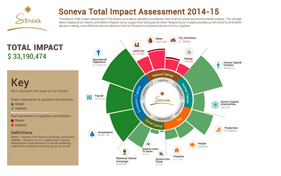Soneva sustainability report- total impact assessment

Assessment translating the company’s impacts into a business measure is a first for the hospitality industry
To measure the total impact that their business has on the natural world and on the communities in which they operate in, Soneva, has conducted the first Total Impact Assessment (TIA) of its activities. It is the first time an evaluation of this magnitude has ever been commissioned in the hospitality industry.
Soneva commissioned the TIA to provide a holistic view of the environmental, human, social, economic and fiscal dimensions of the business.
It measures the impact in five categories – Natural Capital, Human Capital, Social Capital, Economic Capital and Tax – and allows the company to quantify and monetise it in a language that translates to standard business performance metrics.
"We wanted all Soneva enthusiasts to experience our impacts in a language they can easily understand, so we developed the Soneva Total Impact Assessment, which translates our sustainability impacts to a business measure," said Sonu Shivdasani, Founder and CEO of Soneva. "We wanted to tell everyone and especially inspire our guests that we are truly committed to reducing our impact on the environments we operate in and as a whole.
"A company’s contributions to society are traditionally measured in terms of the goods and services that they provide, and the resulting returns they earn in order to compensate capital for its risk," explained Bruce Bromley, Chief Financial Officer, Soneva. "What is often missing is any gauge of the total impact that such activities have on the natural world and on the communities in which they operate, and in many cases, the communities in which the goods and services are consumed."
Soneva’s TIA differs from the usual sustainability reporting in that it assesses the impact of both the company’s direct activities as well as those of its supply chain. Metrics categorised by land use, water consumption, energy consumption and CO2 emissions are used to measure the true cost of the ecosystem services provided to the food and beverage products utilised at the resorts.
"In 2008 we developed the Soneva Carbon Calculator to provide data on our direct and indirect CO2 emissions and our environmental performance," said Arnfinn Oines, Social and Environmental Conscience, who oversees Soneva’s sustainability performance. "We also understood that to effectively direct our resources, we had to also analyse the impact of our supply chain."
Detailed studies of the company’s top 44 products that account for 75% of the total food purchase dollar value are carried out. For the remaining products (in categories such as meat, seafood, fruit and vegetables, groceries, dairy, alcoholic beverages and non-alcoholic beverages), averages are used.
"Our TIA contextualises the environmental impact of our food and beverage supply chain as a percentage of our total impact. It also confirms how important our offsetting strategy is, particularly in areas that necessitate longer-term reduction targets such as our supply chain and guest air travel. That is why we continue to measure our carbon footprint rigorously and why our offsetting programme of environmental and social initiatives via the Soneva Foundation remains central to our vision," said Oines.
The company developed a methodology for an Environmental Profit and Loss (EP&L), or supply chain impacts, which together with the resort and guest travel emissions makes up the natural capital segment of the evaluation. Natural capital is effectively offset against the company’s positive impacts through human and social capital and economic and tax contributions to provide the total impact.
Using the data collected through the TIA, the company will adapt its operational procedures to further reduce the gap between positive and negative impacts.
According to Oines, measures that have worked well so far, such as the two percent environmental levy on guest room revenue and the reduction of the resorts’ energy footprint will continue. "We have expanded our solar PV field at Soneva Fushi, and we have extensive plans for renewable energy and energy saving measures at our new resort development Soneva Jani in the Maldives."
"Our management of waste is a continuing success and is gradually becoming profitable. We export compost from our gardens and import glass waste from other resorts to process at our new Glass Studio", explained Oines.
The company’s TIA shows that the water intensity in their supply chain is much higher than their direct water use and various solutions are being explored to address this problem. "Water provision is always a big challenge for resorts in remote locations. But we are countering this with an improved efficiency distillation plant at Soneva Fushi," said Oines.
Whilst completely committed to reducing their own impact, the company understands that to effect any change in the wider context they need to work with other industry partners, global influencers and the local communities.
Collaboration with organisations such as World Travel and Tourism Council, International Tourism Partnership, The Long Run and NGO partners are ongoing, and the company fosters global connections among experts through its SLOW LIFE Symposium, which has seen the development of close relationships between Symposium participants and the B Team, founded by Richard Branson and Jochen Zeitz to encourage leadership within business.
"Our methodology is openly available in our TIA report as we want this to be a tool for the whole industry. We will constantly be refining and improving our methodology and there are plans to introduce measurements for design and build the next time. But we also welcome any feedback for improvement," said Shivdasani.
Valere Tjolle
@ValereTjolle [email protected]
 United Kingdom
United Kingdom United States
United States Asia Pacific
Asia Pacific












































BA suspending all Heathrow to Abu Dhabi flights
Unexpected wave rocks cruise ship
Report: Cruise guest died after ship lashed in heavy storm
British teen in serious condition after paraglider collision
JetBlue scraps London Gatwick flights